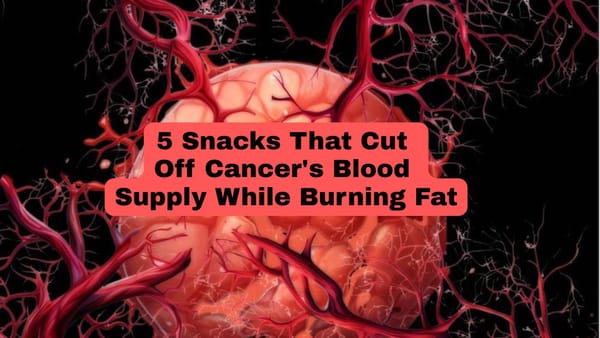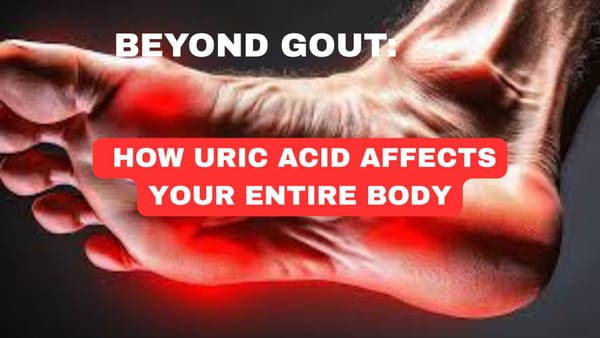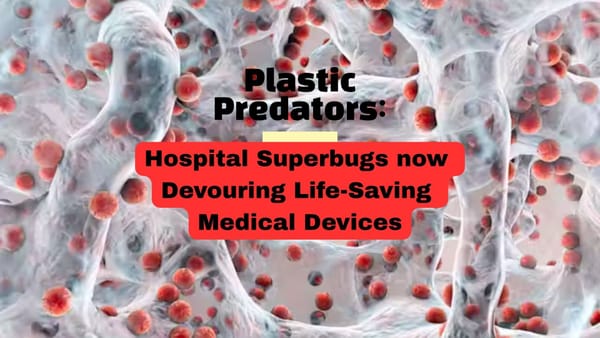Truth About Carbs: Separating Fact From Fiction
About half of all Americans have Insulin Resistance, meaning we are very sensitive to carbs and should limit sugars and starches, not just 'bad" carbs.
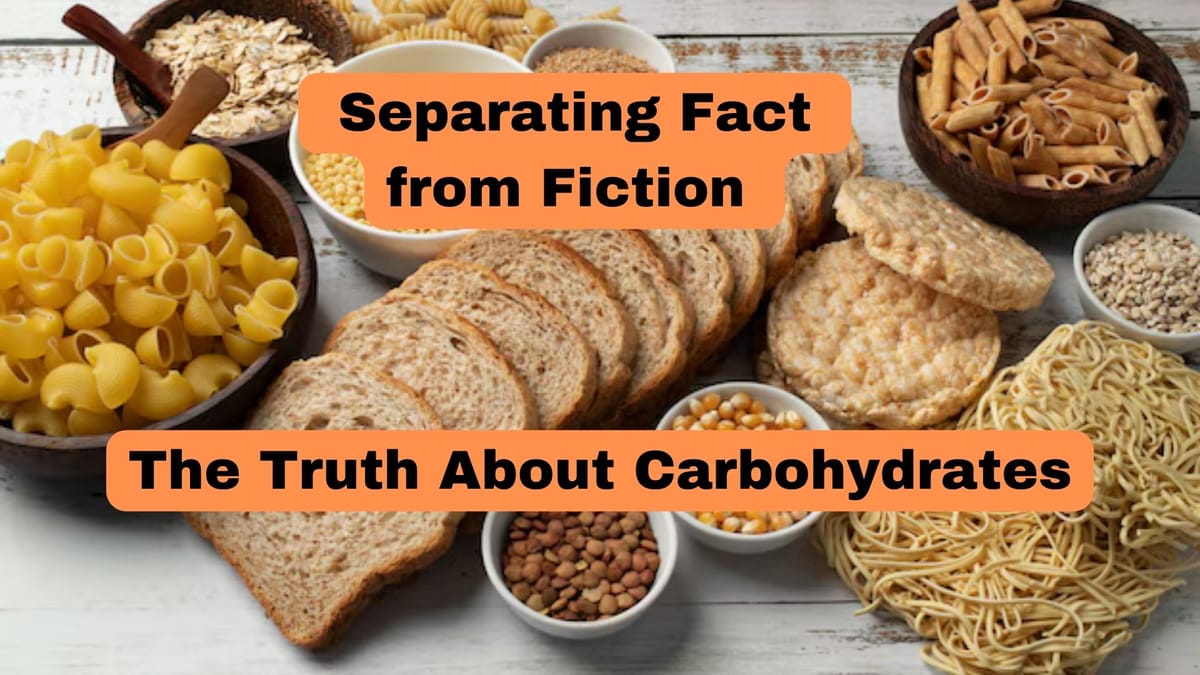
Hello readers, it is so easy to be confused about what is good to eat in 2024, and what is not. I do not doubt from doing lots of research into all areas of nutrition, that these are the latest facts supported by scientists and nutritional psychiatrists. In this comprehensive guide, we sort out the good from the bad, the fact from the fiction, and much more.
Carbs 101: The Definition
First things first, what exactly are carbohydrates? Simply put, they're sugars and starches - tiny molecules of carbon, hydrogen, and oxygen. Both plants and animals use them for energy and building body parts.
Sugar vs. Starch: The Sibling Rivalry
- Sugars: These are the small fries of the carb world. Think glucose (a single molecule) or table sugar (two molecules stuck together).
- Starches: The big boys on the block. They're made up of lots of simple sugars linked together, like in potatoes or corn.
Fun fact: Animals have a special starch called glycogen. It's like our personal energy stash for emergencies.
Storage - Fat vs Starch
Have you wondered why we store energy as fat instead of starch? It's all about mobility. Imagine lugging around giant spud-like lumps? Fat is lighter, flexible, and we can store tons of it. This is why animals like us, need to move around and store energy as fat. There is a low limit to the amount of glycogen we can store, but the amount of fat we can store is unlimited. (Another clue why humans are designed to burn fat, not carbohydrates.)
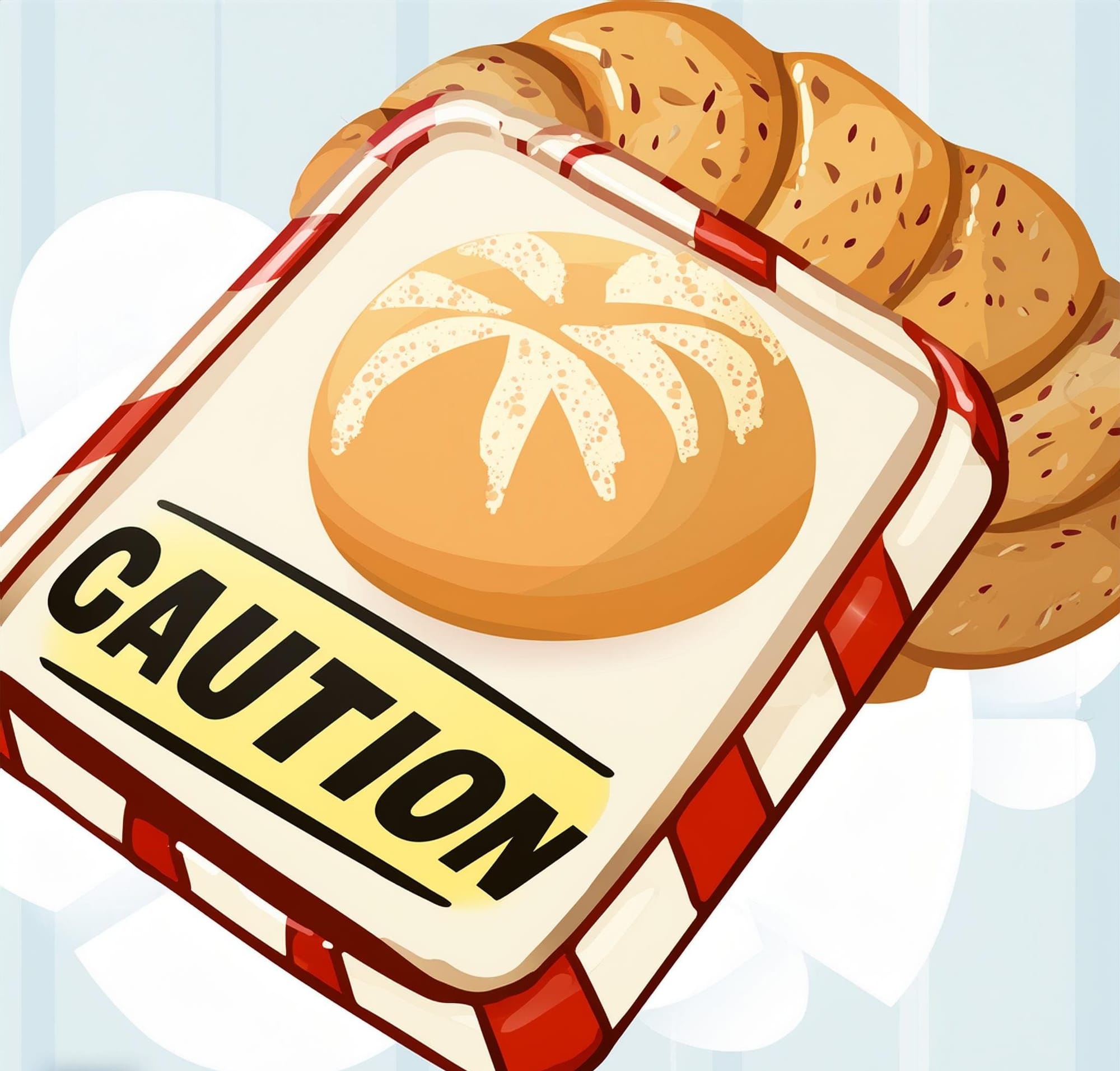
Hypoglycemia "Roller-Coaster
If you are carb-sensitive (or have insulin resistance), you may have an exaggerated response to eating that cookie. This means that your blood sugar will rise more than usual and stay higher for longer - it also means that your insulin level will rise more than usual, and stay higher for longer. The result is that your blood sugar will drop too low or too fast. The body responds to this crisis, because it is dangerous for blood sugar to drop too low.
Other hormones work against insulin and raise blood sugar. One of these is epinephrine, known as adrenaline. Epinephrine raises blood sugar by turning off insulin release and signalling the liver to break down some of its emergency glycogen supply into glucose and release it into the bloodstream. Epinephrine is an ancient “fight or flight” hormone produced when we are in danger. It is designed to give our bodies a surge of energy to help prepare us to fight or run away, but if we don’t use that energy to fight or flee, it just tends to make us feel panicky.
The epinephrine reaction is responsible for most symptoms of “hypoglycemia”, which can occur within a couple of hours of eating sweet or starchy foods. Other hormones that are released to counteract insulin include glucagon (which may cause hunger sensations, headaches, and stomach upset), cortisol (our “stress hormone”), and growth hormone. These hormones work together to switch off our insulin response and return our blood sugar to normal.
This unstable pattern happens to some several times per day. Most people eat refined and high glycemic index (GI) carbs daily, and may not be aware that their daily cycles of moodiness, hunger, and physical discomfort are tied to this invisible hormonal roller coaster.
Why We Gain Weight from Carbs
You eat a cookie. The simple sugars in that sweet treat are rapidly absorbed into your bloodstream, and your blood sugar quickly rises. Since the body wants to harness that energy and prevent high blood sugar, your pancreas releases the hormone insulin into your bloodstream. Insulin lowers your blood sugar putting the body into sugar-burning, fat-storing mode. It turns off your body’s ability to burn fat so that excess sugar will be burned instead of fat. However, if your body already has sufficient energy and your cells don’t need to burn more sugar, insulin signals the liver to convert the extra sugar into fat (lipogenesis). This fat goes into your fat cells, and that is how carbs (sugar) can make us fat.
Now, if you are not carbohydrate-sensitive, that may be the end of the story. You ate the cookie, your blood sugar rose briefly, but insulin quickly took care of it, and now you’re fine. But what if you are carbohydrate-sensitive? Take this quiz.
How Many Carbs Do Our BODIES NEED?
None - once we're off breast milk, we can survive without consuming a single carb, providing that adequate amounts of protein and fat are consumed.
How Many Carbs Do Our BRAINS Need?
- They don't need much glucose (about 1/8 to 1/2 cup per day).
- The brain can use other fuels like ketones from fat, and lactate created by working muscles.
- Our livers can make glucose from protein if needed. This process is called "gluconeogenesis" meaning "making sugar from scratch." You do not have to eat sugar to make blood sugar.
WHICH Carbs Can We Eat?
We should avoid refined carbohydrates and added sugars as much as possible. But what about sugars and starches from whole foods, such as fruits, starchy vegetables, and whole grains?
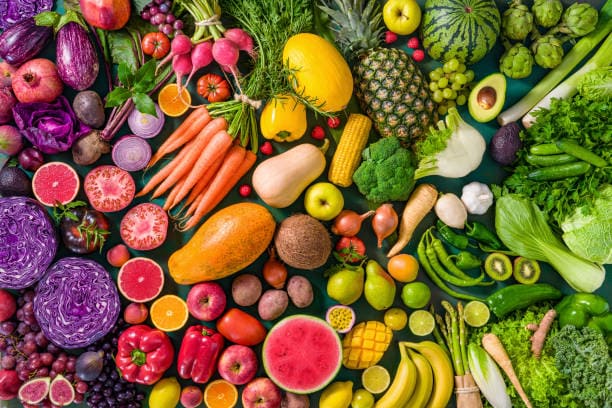
Modern Diseases from Consuming "Refined" Carbs
A growing number of scientists now believe that our Western diet, especially refined carbohydrates may be the cause of many of the following modern diseases:
- Coronary artery disease
- Obesity
- Heart disease
- Certain cancers
- Type 2 diabetes
- Alzheimer's disease
- Mental health issues
- Cancer
- Hypertension
- Peripheral vascular disease
- Osteoporosis
- Acne
- Diverticulitis
- Appendicitis
There have been numerous traditional human societies, which have eaten diets high in carbohydrates and been healthy. However, the types of carbohydrates in these diets were unrefined and tended to be low in Glycemic Index (GI).
Advanced glycation end products (AGE’s)
Fast carbs raise blood sugar levels, and excess blood sugar can bind to vital proteins, DNA, RNA, and fats and damage them, sometimes beyond repair. This process is called “glycation”. (Think of it this way: sugars make proteins sticky. Proteins are supposed to be able to fold and move in special ways to perform their various functions, but they can’t do that if sugar is gumming up the works. When sugars bind permanently to proteins, they turn the proteins into nuisance compounds called “Advanced Glycation End Products” or AGE’s. AGE’s have been linked to a wide variety of chronic diseases, including heart disease, kidney failure, diabetic retinopathy, Alzheimer’s disease, and aging.
Carbohydrates and oxidative damage
Fast carbs are “pro-oxidants.” This means that they can damage important body molecules, such as DNA, by stealing their electrons away from them. Pro-oxidants are the opposite of anti-oxidants; they fight against each other. In a healthy body, pro-oxidants and antioxidants are in balance. However, most of us are out of balance, most likely due to our Western diet, which is very high in pro-oxidants, such as refined carbohydrates.
We are told all the time that we need to eat foods high in antioxidants but we are never told that we are supposed to avoid foods that are high in pro-oxidants! Perhaps excluding pro-oxidants, scientists wouldn’t think we needed to add anti-oxidants to our bodies.
Oxidative damage caused by pro-oxidants such as sugars can be the first step towards serious problems, such as cancer (by damaging DNA) and heart disease (by oxidizing cholesterol).
Carbohydrates and inflammation
Both glycation and oxidation trigger inflammation in the body. Physicians and scientists now understand that most common chronic diseases are rooted in inflammation. This is not necessarily the kind of inflammation we can see or feel—it is usually on a much smaller scale that we may not be aware of.
For example, the cholesterol plaques that block arteries to the heart and cause heart attacks contain all the mini-markers of inflammation when you look at them under a microscope. Even diseases such as depression are associated with mini-markers of inflammation.
What Exactly are Refined Carbohydrates and Refined Grains?
- Excepting for natural whole foods like an apple or other fruit, a bean or potato, as can be found in nature, all starches and sugars are considered refined carbohydrates.
- Refined carbs do come from natural whole foods but have been processed to "refine" them. These methods include industrial extraction, purification, concentration and enzymatic transformation. It's easy for most of us to identify sugar, because they are sweet and come as crystals, syrups, or powders. Refined starches such as refined grains, are a lot more confusing.
- Whole grains are intact complete kernels with their outer bran coating as found in nature. Once the grain is broken into pieces through processing, it can be considered "refined
The more finely a grain is ground, the smaller the particles. The smaller the particles, the more refined the grain. "Stone-grinding produces large, coarse particles, whereas industrial refining produces fine powders with all fibre and other nutrients stripped away. Coarse stone-ground grain meals and cracked kernel grains are among the least refined and soft, powdered grains (flours of all kinds and starches such as corn starch) are more refined.
- The smaller the particles, the easier they are to digest. The easier they are to digest, the faster your blood sugar will rise after you eat them.
- Some forms of grain processing do not involve grinding at all, eg polishing, high-heat treatment, and extrusion puffing. These processes damage or remove the bran coating of grains, making the grains faster to cook and the starches inside easier to digest.
List of Refined Carbohydrates To Avoid
Refined and Simple Sugars or "added sugars "
- Table sugar/white sugar (aka sucrose; may be cane sugar or beet sugar)
- Confectioner's sugar (powdered white sugar)
- Honey (Even though honey exists in nature and isn't refined, it is a pure sugar that is difficult to obtain in significant quantities without special equipment or risk. Honey affects our health in the same way that other sugars do.)
- Agave syrup
- Corn syrup and high-fructose corn syrup
- Brown sugar
- Molasses
- Maple syrup
- Fructose
- Brown rice syrup
- Maltose
- Glucose syrup
- Tapioca syrup
- Rice bran syrup
- Malt syrup
- Dextran
- Sorghum
- Treacle
- Panela
- Saccharose
- Carob syrup
- Dextrose, dextran, dextrin, maltodextrin
- Fruit juice concentrates
All fruit juices (except lemon and lime juice)
Juicing fruits eliminates the fibre (that fills you) and leaves only the sugars and water. Most fruit juices require special equipment to produce in significant quantities.
All types of flour
- Wheat, oat, legume (pea and bean), rice, and corn flours. One hundred percent stoneground, whole meal flours are less refined and not as unhealthy as other flours because they are not as finely ground and take longer to digest.
- Instant/refined grains.
- Instant hot cereals like instant oatmeal, white rice, polished rice, and instant rice.
Refined starches
- Corn starch, potato starch, modified food starch—essentially any powdered ingredient with the word “starch” in it
Some Foods high in refined carbohydrates and added sugars
- All desserts except whole fruit
- Ice cream, sherbet, frozen yogurt, etc.
- Most breads
- Many crackers (100% stone-ground whole grain crackers are less refined)
- Cookies
- Cakes
- Muffins
- Pancakes
- Waffles
- Pies
- Pastries
- Candy
- Chocolate (dark, milk and white). Baker's chocolate is unsweetened and is therefore an exception.
- Breaded or battered foods
- All types of dough (phyllo, pie crust, etc)
- Most cereals except for unsweetened, 100% whole grain cereals in which you can see the whole grains in their entirety with the naked eye (unsweetened muesli, rolled oats, or unsweetened puffed grain cereals are good examples)
- Most pastas, noodles and couscous
- Jellies, jams and preserves
- Bagels
- Pretzels
- Pizza (because of the flour in the dough)
- Puddings and custards
- Corn chips
- Caramel corn and kettle corn
- Most granola bars, power bars, energy bars, etc (unless labelled sugar-free).
- Rice wrappers
- Tortillas (unless 100% stone-ground whole grain)
- Most rice cakes and corn cakes (unless labelled 100% whole grain)
- Panko crumbs
- Croutons
- Fried vegetable snacks like green beans and carrot chips (usually contain added dextrin, a sweet starch)
- Ketchup
- Honey mustard
- Most barbecue sauces
- Check labels on salsa, tomato sauces, salad dressings and other jarred/canned sauces for sugar/sweeteners
- Sweetened yoghurts and other sweetened dairy products
- Honey-roasted nuts
- Sweetened sodas
- Chocolate milk (and other sweetened milks)
- Condensed milk
- Hot cocoa
- Most milk substitutes (almond milk, soy milk, oat milk, etc) because they usually have sugar added--read label first
- Sweet wines and liqueurs
Some Foods low in refined carbs/added sugar
- Fresh/frozen meat, poultry, and seafood
- Eggs
- Fresh or frozen unsweetened fruits
- All vegetables
- Whole grains (whole grain rice, oats, barley, quinoa, corn, etc)
- Nuts and seeds of all types
- Unsweetened nut butters
- Unsweetened coconut
- Popcorn
- 100% wholegrain rice cakes
- Whole legumes (beans, peas, lentils)
- Guacamole
- Unsweetened salsa
- Vegetable tapenades
- Olives
- Unsweetened pickles
- Soy products (like tofu and unsweetened or sugar-free soy milk)
- Unsweetened, all-natural dairy products (milk, plain yoghurt, cheeses, butter, cream, half-and-half, sour cream, etc)
- 100% stone-ground wholegrain breads or crackers without sugar added
- Unsweetened tomato sauce and other unsweetened, starch-free sauces
- Unsweetened salad dressings (most fat-free dressings contain sugar—check labels). Low-sugar options include blue cheese, ranch, full-fat Italian, Greek, Caesar dressings.
- Herbs and spices
- Oils
- Unsweetened vinegar (balsamic vinegar and certain other fruity vinegar can be sweet—read label for carbohydrate content)
- Textured vegetable protein
- Seitan
- Tempeh
- Unsweetened coffee, tea, sparkling water (either plain or with natural flavors or essences added), water
- Most red wines, dry white wines and spirits (whiskey, gin, vodka, etc)
Key Takeaways
As long as you are consuming adequate protein and fat, it is unnecessary to eat carbohydrates once you are old enough to eat solid food.


